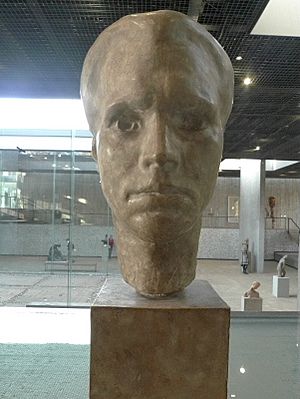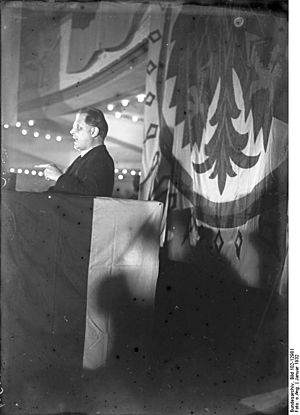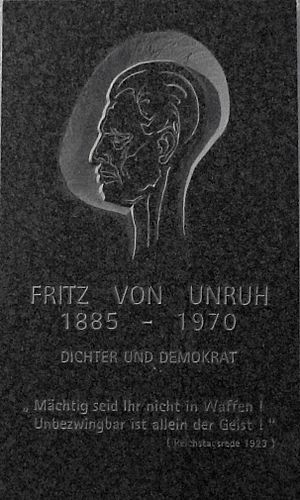Fritz von Unruh facts for kids
Quick facts for kids
Fritz von Unruh
|
|
|---|---|

Porträtkopf Fritz von Unruh (1918)
|
|
| Born | 10 May 1885 Rhine Province, Germany |
| Died | 28 November 1970 Diez an der Lahn, Germany |
| Occupation | Dramatist, poet, novelist |
| Nationality | German |
| Literary movement | Expressionism |
Fritz von Unruh (born May 10, 1885 – died November 28, 1970) was a German writer. He wrote plays, poems, and novels. He was part of a creative movement called Expressionism.
Contents
About Fritz von Unruh
Fritz von Unruh was born in Koblenz, Germany. His father was a general. Fritz was an officer in the German army. But he left the army in 1912 to become a writer.
Early Writings and Beliefs
Two of his first important works were the play Offiziere (meaning "Officers") from 1911 and the poem Vor der Entscheidung ("Before the Decision") from 1914. These works showed his strong belief against war. He also believed that society should be built on people's honesty and their duty to others, not just on rules from above.
Unruh's writings often spoke out against war. He called for world peace and for people to live together like brothers and sisters. Some of his famous works include Der Opfergang ("Way of Sacrifice"). This was a powerful anti-war story written during the Battle of Verdun in World War I. It was published in 1919. Other important works are Ein Geschlecht ("A Family") from 1916, its follow-up Platz (1920), and Heinrich von Andernach (1925).
Opposing the Nazis
Fritz von Unruh was strongly against the Nazi Party. He wrote several works that warned people about what would happen if the Nazis took over. These included Bonaparte (1927), Berlin in Monte Carlo (1931), and Zero (1932).
Because he opposed the Nazis, he left Germany in 1932 and moved to France. Later, he moved to the United States. He finally returned to Germany in 1962. He passed away in the town of Dietz when he was 85 years old.
Awards and Recognition
Fritz von Unruh received many honors for his writing. These awards show how important his work was.
- 1914 Kleist Prize for Louis Ferdinand Prinz von Preußen
- 1923 Grillparzer Prize
- 1947 Wilhelm Raabe Prize
- 1948 Goethe Prize of the City Frankfurt am Main
- 1955 Goethe Plaque of the City of Frankfurt
- 1966 Carl von Ossietzky Medal
Main Works
Fritz von Unruh wrote many different types of works. Here are some of his most well-known plays and novels.
Plays (Dramas)
- Jürgen Wullenweber, 1908
- Offiziere, 1911
- Louis Ferdinand Prinz von Preußen, 1913
- Ein Geschlecht, 1917
- Platz, 1920 (a follow-up to Ein Geschlecht)
- Stürme, 1922
- Rosengarten, 1923
- Bonaparte, 1927
- Phaea, 1930
- Zero, 1932
- Gandha, 1935
- Charlotte Corday, 1936
- Miss Rollschuh, 1941
- Der Befreiungsminister, 1948
- Wilhelmus, 1953
- Duell an der Havel, 1954
- Bismarck oder Warum steht der Soldat da?, 1955
- Odysseus auf Ogygia, 1968
Novels
- Opfergang, 1918
- Der nie verlor, 1948
- Die Heilige, 1952
- Fürchtet nichts, 1952
- Der Sohn des Generals, 1957
See also
 In Spanish: Fritz von Unruh para niños
In Spanish: Fritz von Unruh para niños
 | Aaron Henry |
 | T. R. M. Howard |
 | Jesse Jackson |



